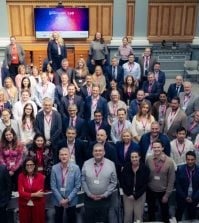Canada’s former digital chief to lead on government ID verification at US university

Aaron Snow, who stepped down as Canadian Digital Service (CDS) CEO last month, has taken up the role of faculty fellow at Georgetown University’s Beeck Center for Social Impact and Innovation.
He will lead the center’s State Software Collaborative, which facilitates the cooperative development of software for use by US government agencies and includes work on identity verification.
A Beeck Center report published earlier this month explored how US state and local governments are adapting federal government’s Login.gov, which enables citizens to use a single password to access participating agencies’ services. Through its research, the center recognises that lessons can be learnt from countries such as the UK, where it’s common for local authorities to share back office services such as HR and digital.
Snow’s remit is to continue the center’s work in this area. “To take this work to the next phase, we are thrilled that Aaron Snow will join our team… Aaron knows what it takes to deliver services at scale and how critical software is for delivery,” the Beeck Center tweeted.
Sharing the news of his appointment on social media, Snow said he was “really excited” to be joining the Center and described the move as a new adventure. He said he would hold the post for one year.
The Beeck Center was founded in 2014 and provides training and experiences for global leaders with the aim of helping them to enact social change. The Center is based in Washington DC, marking a return to the US for Snow, who is American.
‘Big things lie ahead’
Snow headed up the CDS from April 2018 – less than a year after its launch – until 3 September 2021. He was recruited as its first CEO.
Announcing that he had left the CDS, Snow said he was proud of what the service had accomplished “in its first chapter”, citing the COVID Alert app; the part CDS is playing in helping people find financial help during the pandemic; and GC Notify, which enables government departments to email or text citizens who use their services.
“I’m proud of how much we’ve helped build digital capabilities across the public service, and of how we’ve worked in the open on all of it,” he said. “This team has demonstrated the art of the possible, and big things lie ahead.
“To everyone who welcomed me so warmly to Canada, and to all the public servants who work every day serving the public, thank you. It’s been amazing.”
Last week, Snow – free from the restrictions on what public servants can and can’t say in the run-up to a national election – reflected more fully on his time at the CDS. He listed some of the CDS’s standout accomplishments, but said “there’s still a great deal to do”.
He said government leaders must hold the public service to account on building the capabilities needed to deliver the promise of digital services, and added that not enough departments “meaningfully design with users”, iterate and improve frequently, use open standards, build in accessibility from the start, or empower their teams.
From 18F to CDS
Snow began his career in government as a presidential innovation fellow at the White House Office of Science and Technology Policy, before co-founding and later becoming executive director of 18F – a government start-up focused on building user-centric digital services – in 2013. The CDS is modelled on 18F. He was deputy commissioner and later senior adviser at the General Services Administration’s Technology Transformation Service, and undertook stints at private sector companies before joining CDS. He is also a board member at the OpenGov Foundation.
Snow, who holds a degree in computer science from Harvard University, attended Global Government Forum’s inaugural Digital Summit in London in September 2019.
Anatole Papadopoulos, formerly the CDS’s executive director, has become its acting CEO. It is not clear who will succeed Snow.























